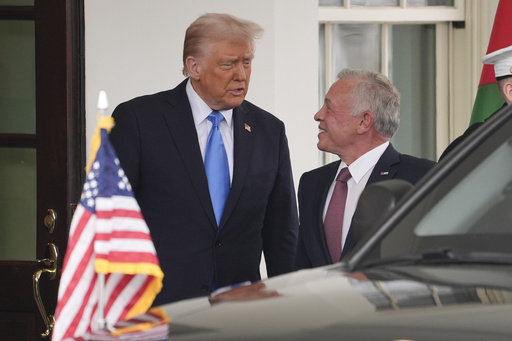On Tuesday, President Donald Trump welcomed King Abdullah II of Jordan to the White House, where discussions revolved around the contentious issue of Gaza. Trump put forth a controversial proposal suggesting that Gaza could be emptied of its inhabitants, managed by the United States, and converted into a tourist attraction.
This ambitious concept poses challenges, particularly the expectation that Jordan and other Arab nations would accept a significant influx of Gazans—a notion strongly rejected by Abdullah following their discussions. The meeting, which included Secretary of State Marco Rubio, saw Trump maintaining that he would not threaten to cut U.S. aid to Jordan or Egypt should they refuse to raise the number of Gaza residents they take in. “I don’t have to threaten that. I do believe we’re above that,” Trump stated, which contradicted earlier comments suggesting a potential withdrawal of aid.
During the meeting, King Abdullah faced numerous inquiries regarding Trump’s plan to evacuate Gaza and turn it into a coastal resort. He refrained from providing detailed responses and did not commit to accepting a large number of Gazans. However, he expressed readiness to accept “right away” as many as 2,000 children from Gaza who are suffering from serious health issues. The king praised Trump, expressing, “I finally see somebody that can take us across the finish line to bring stability, peace and prosperity to all of us in the region.”
After their two-hour discussion, Abdullah proceeded to meet with lawmakers on Capitol Hill. He reiterated Jordan’s unwavering stance against the displacement of Palestinians in Gaza and the West Bank, stating on social media, “This is the unified Arab position. Rebuilding Gaza without displacing the Palestinians and addressing the dire humanitarian situation should be the priority for all.” This affirmed the kingdom’s position amidst Trump’s insistence on the U.S. possibly taking control of the war-torn region without clarifying the specifics of such control.
Trump proclaimed that the U.S. could oversee Gaza without the need for significant funding, suggesting a redevelopment that could include new hotels, offices, and homes to make it “exciting.” He remarked on the potential appeal of such developments, claiming that the residents would be enamored with the changes while emphasizing his personal detachment from the development process. The president has previously proposed the idea of displacing Gaza’s inhabitants, either temporarily or permanently, which has faced widespread condemnation from leaders across the Arab nations.
Additionally, Trump reiterated his stance that a fragile ceasefire between Hamas and Israel could be voided if the latter does not facilitate the release of all remaining hostages by an upcoming deadline. “I don’t think they’re going to make the deadline, personally,” he remarked, alluding to Hamas’ position in the negotiations.
King Abdullah’s visit came at a critical time for the ongoing ceasefire, with Hamas claiming that Israel had violated the truce and announcing delays in future hostage releases. Subsequently, Hamas decried Trump’s comments as “racist” and labeled them a push for ethnic cleansing, accusing the president of attempting to undermine Palestinian rights.
Trump’s propositions have included significant resettlement plans, envisioning Gaza as “the Riviera of the Middle East,” while expressing intentions of relocating Palestinians into neighboring countries without a path to return. His recent commentary on potentially withholding aid from crucial U.S. allies such as Jordan and Egypt, designed to pressure them into accepting more refugees, contradicts the prior understanding of U.S. support for these nations. Jordan currently harbors over two million Palestinians, and officials have firmly expressed their opposition to any measures that would involve displacing Gaza’s residents, framing their position as steadfast.
Beyond humanitarian concerns, both Egypt and Jordan have communicated apprehensions regarding security implications tied to a substantial increase in refugees. Trump first aired his views on resettling Palestinians at a recent press conference held with Israeli Prime Minister Benjamin Netanyahu, where he even considered the deployment of U.S. troops for securing Gaza. While asserting that no American funds would finance the region’s reconstruction raised several uncertainties about the feasibility of his plans.
After the president’s initial remarks, Secretary Rubio and White House Press Secretary Karoline Leavitt emphasized that any relocation would be intended to be temporary, aimed at facilitating recovery efforts. However, when pressed about whether Gazans would have the right to return under his proposal, Trump clearly stated, “No, they wouldn’t.”




